Field Diary Chattogram Port: Transition from National to Regional Transportation HubThis study conducted by CUTS International, India, in collaboration with Unnayan Shamannay assesses infrastructure and trade logistics at Chattogram Port, Bangladesh. Chattogram Port is considered the maritime gateway of Bangladesh, with nearly 90% of Bangladesh trade passing through through the port. The study noted points of conflict between policy and practice while stakeholders identified the support needed to ensure that regional multimodal connectivity delivers its projected benefits. Author: CUTS International Year: 2021 Download Tags: Bangladesh, Trade Policy, Ports 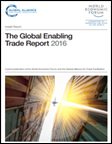 Global Enabling Trade Report 2016The Global Enabling Trade Report has been created to provide insight into trade policy and practice. It includes the Enabling Trade Index (ETI), which assesses the extent to which economies have in place institutions, policies, infrastructures and services facilitating the free flow of goods over borders and to their destination. This edition highlights that while an increasingly globalized trading system has been lifting millions out of poverty, trade barriers and costs are still preventing millions of people around the world from engaging in international trade. It reports that all South Asian economies have improved their ETI score over the past two years, with Bhutan as the most improved country in the region, jumping 12 places to 92, followed by India at 102, Sri Lanka at 103, Nepal at 108, Pakistan at 122, and Bangladesh at 123, yet the region remains the most closed worldwide. While South Asia has improved its access to foreign markets and adoption of ICTs, it needs to improve access to its domestic market – on average, South Asian countries impose a tariff of 16.7% on imported products – and enhance its transport infrastructure, particularly in Bhutan and Nepal. Author: Global Alliance for Trade Facilitation and the World Economic Forum Year: 2016 Download Tags: Trade, Trade Facilitation, Transport, Trade Policy, World Economic Forum, Bangladesh, Bhutan, India, Sri Lanka, Pakistan Research Handbook on Trade in ServicesThis Research Handbook explores the latest developments in services trade by drawing on insights from experts with a range of perspectives, including empirical economics, law and global political economy. The book further chronicles the rising stakes and involvement of developing countries in global services trade, notably their growing insertion in global value chains, as well as the latest advances and remaining challenges in the statistical measurement of trade in services. Author: Pierre Sauvé and Martin Roy, editors Year: 2016 Download Tags: Services, Trade, Economics, Trade Facilitation, Trade Policy A Framework of Trade Policy for Bhutan: Compatible with the Gross National HappinessThis paper examines the compatibility between Bhutan's gross national happiness (GNH) index and trade policy, and attempts to contextualize Bhutan's trade policy issues - inclusive growth, trade facilitation, incidence of tariffs, and World Trade Organization accession. It explores trade and industry policy that is compatible with GNH guidelines, which aim to measure and improve people's holistic well-being: although it also includes factors that are seemingly unfavorable to an active trade policy. The report recommends benchmarking successful development strategies in other countries and creating an organization to pursue a more active trade policy to accomplish the urgent task of raising general living standards. Author: Inkyo Cheong, Taeho Bark, and Hoe Yun Jeong Year: 2015 Download Tags: Bhutan, WTO, Trade Policy, ADB World Trade Organization Annual Report 2015The World Trade Organization (WTO) Annual Report 2015 provides an overview of WTO activities in 2014 and early 2015. It presents a timeline of two decades of the WTO -- from its origins succeeding the General Agreement on Tariffs and Trade to its current role in the multilateral trading system. It presents a chapter on how WTO helps developing countries build trade capacity and allows them to implement trade agreements. WTO training courses are organized for officials from developing countries each year. Author: World Trade Organization Year: 2015 Download Tags: Trade, Trade Policy, WTO, Tariffs, Energy, Bangladesh, India, Nepal, Sri Lanka, Trade Facilitation, Transport, Asia, Agriculture Aid for Trade at a Glance 2015: Reducing Trade Costs for Inclusive, Sustainable Growth High trade costs inhibit trade integration in various developing countries, slowing growth and development prospects. This joint OECD/WTO publication emphasizes the Aid-for-Trade Initiative as an example of how to reduce trade costs and contribute to the emerging post-2015 development agenda. It calls for redoubling of efforts to tackle the issue of trade costs that continue to marginalize many of the world’s poorest and most fragile economies. The chapters highlight main achievements and challenges of the Aid-for-Trade Initiative. It further suggests a focus on reducing trade costs for an integrated approach in achieving inclusive and sustainable development outcomes. Author: World Trade Organization and Organisation for Economic Co-operation and Development Year: 2015 Download Tags: Aid for Trade, Trade Policy, WTO Cross-Border Electricity Cooperation in South AsiaStrengthening cross-border electricity cooperation in South Asia can be part of the solution for providing adequate and reliable electricity. This World Bank Policy Research Working Paper reviews the status of cross-border electricity cooperation in South Asia, identifies key regional-level barriers to expand cross-border cooperation and trade in South Asia, and discusses the extent to which current domestic sector policies impede greater cross-border electricity cooperation. Finally, the findings offer policy recommendations on increased cross-border trade and cooperation. Author: Anoop Singh, Tooraj Jamasb, Rabindra Nepal, and Michael Toman Year: 2015 Download Tags: Energy, Regional Cooperation, Regional Trade, Bangladesh, Bhutan, India, Maldives, Nepal, South Asia, Sri Lanka, Trade, Trade Policy, WB Enabling Trade: Increasing the Potential of Trade Reforms This publication reviews specific elements of trade reform and proposes potential improvements that governments can make in collaboration with the private sector, using case examples to illustrate supply chain bottlenecks. It further examines how national governments and the private sector can optimize
ongoing trade reforms to reduce or eliminate these obstacles. Author: Bain and Company and the International Trade Centre Year: 2015 Download Tags: Trade, Private Sector, Trade Policy Towards Trade Policy Analysis 2.0: From National Comparative Advantage to Firm-Level Trade DataThis paper argues for the need to upgrade current analytical tools for trade policy analysis and complement them with more detailed, firm-level data. Firm-level data allows a more refined assessment of future impact of trade policy initiatives, improves ex-post assessments, and enhances communication leading to a meaningful engagement with stakeholders, thus reducing public misperceptions about trade policy. A Trade Policy Analysis 2.0 could contribute to a better understanding of international trade for firm competitiveness, job creation, and consumer welfare. Author: Lucian Cernat Year: 2015 Download Tags: Trade Policy, Firms, Trade, ADB National Trade Facilitation Bodies in the World This UNCTAD publication provides the first, in-depth quantitative analysis of 50 existing national trade facilitation bodies and a first-hand set of recommendations from experiences of participating stakeholders. It offers policy-oriented conclusions to assist countries about to set up or strengthen their national trade facilitation working groups. The study reveals that the biggest challenge for trade facilitation working groups is sustainability. Its determining elements include the administrative culture of each country, level of development, or type of body and geographical region. Author: United Nations Conference on Trade and Development Year: 2014 Download Tags: Trade Facilitation, Trade Policy, Sustainability, UNCTAD, Bangladesh, Bhutan, Nepal, Sri Lanka A World Trade Organization for the 21st Century: The Asian PerspectiveThis Asian Development Bank Institute book examines key changes in the world trading system and explores policy implications for Asia. Through a compilation of essays from prominent international and Asian trade experts, this book presents interaction of market forces and trade regulation. Lessons from the Asian experience offer new approaches and economic policies to sustain growth, presenting the World Trade Organization as a forum to improve regional and global trade governance in the 21st century. Author: Richard E. Baldwin, Masahiro Kawai, Ganeshan Wignaraja (Eds.) Year: 2014 Download Tags: Trade, Trade Policy, WTO, Bangladesh, Bhutan, Energy, India, Maldives, Nepal, Sri Lanka, Transport Bridging Transport, ICT, and Energy Infrastructure Gaps for Seamless Regional ConnectivityThis publication is a contribution by the United Nations Economic and Social Commission for Asia and the Pacific to deliberations at the Second United Nations Conference on Landlocked Developing Countries (LLDCs) in Vienna, Austria, 3-5 November 2014. It shows regional connectivity as an unfinished agenda and bridging infrastructure gaps as a complex challenge for LLDCs. While physical infrastructure is a priority, this report argues that deeper regional integration – through regionally cohesive and terrestrial networks – is key to effectively linking Asian LLDCs to the region’s infrastructure networks. Author: United Nations Economic and Social Commission for Asia and the Pacific Year: 2014 Download Tags: Transport, ICT, Energy, UNESCAP, SASEC, Connectivity, Infrastructure, Bangladesh, India, Nepal, Sri Lanka, Trade, Trade Facilitation, Policy, Trade Policy Mega-regional Trade Agreements: Game-Changers or Costly Distractions for the World Trading System?This document explores the impact of regional trade agreements such as mega-regionals on countries that are not part of World Trade Organization negotiations. It focuses on trade-diverting effects of Trans-Pacific Partnership and Trans-Atlantic Trade and Investment Partnership such as the potential for multilateralization and discrimination. The report further explores potential impact of mega-regionals on Asia-Pacific, Sub-Saharan Africa, and Latin America. The latter sections highlight the opportunities and challenges in promoting coexistence of these future agreements with the multilateral trading system. Author: World Economic Forum Year: 2014 Download Tags: Asia-Pacific, Regional Trade, Trade Policy, India, WTO Future of Factory AsiaThis volume, co-published by the Asian Development Bank and the Korea Economic Research Institute, reflects one of the broad thematic sessions of the Seoul conference, Beyond Factory Asia. It assesses the challenges and sustainability of the Factory Asia model – supplying from the East and consuming in the West – and provides suggestions and strategies on effective management of these concerns. The volume further analyzes obstacles in the success of Factory Asia, its speed in expanding its own domestic and regional markets, and its progress in upgrading competitiveness in the manufacturing sector. The new Factory Asia must nurture new sources of growth in the region and focus on regional economic integration. Author: Choi Byung-il and Changyong Rhee (eds.) Year: 2014 Download Tags: Economic Integration, Asia-Pacific, Trade Policy, ADB, Asia, Manufacturing, Regional Integration, Bangladesh, Energy, Sri Lanka, Transport 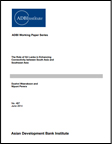 The Role of Sri Lanka in Enhancing Connectivity between South Asia and Southeast Asia As Sri Lanka rebuilds at the end of a 30-year conflict, its progress in improving physical infrastructure—including the Colombo port expansion and other programs for new expressways and road connectivity—has been significant. Yet, the country has seen a sharp decline in its overall exports-to-gross domestic product ratio. How Sri Lanka can benefit from greater connectivity with its neighbors in South Asia and Southeast Asia is discussed in this paper. Trade policies geared towards enhancing regional integration efforts could boost Sri Lanka's economy. Additionally, to lessen the challenges of financing and sustaining implementation of planned infrastructure development efforts, Sri Lanka could also implement a more stringent institutional and regulatory environment encouraging more private sector participation. Author: Dushni Weerakoon and Nipuni Perera Year: 2014 Download Tags: Trade Policy, Trade Facilitation, Sri Lanka, Connectivity, South Asia, Southeast Asia, ADB, Transport, Regional Integration 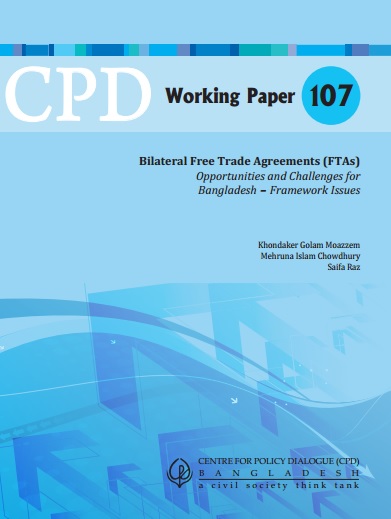 Bilateral Free Trade Agreements: Opportunities and Challenges for Bangladesh - Framework IssuesSlow progress of negotiations for multilateral trade under the World Trade Organization and the global economic crisis have led to a rise in Free Trade Agreements (FTAs) in developing countries, yet Bangladesh has remained ambivalent in setting its strategies regarding FTAs. Instead, it has opted to maintain exports through preferential market access with its partners among developed countries. This report cautions that with the increasing reduction of tariffs among developed countries, Bangladesh's preferential market access with these trading partners will soon lose its luster. On the other hand, exploring alternative markets by signing FTAs among least developed countries and developing countries in South Asia may be a better option for Bangladesh. This policy paper argues that Bangladesh needs to expand its export market by exploring bilateral FTAs with other trading partners, including its neighbors in the South Asia region. Author: Khondaker Golam Moazzem, Mehruna Islam Chowdhury, and Saifa Raz Year: 2014 Download Tags: Trade, Trade Policy, Bangladesh The Long and Winding Road: How WTO Members Finally Reached a Trade Facilitation Agreement The conclusion of the Agreement on Trade Facilitation at the Bali negotiations in December 2013 marked the end of a journey that lasted almost a decade. As the first multilateral trade agreement successfully negotiated by World Trade Organization (WTO) ministers, it broke new ground in the decentralized, bottom-up way the negotiations were structured; in the manner the capacities and resources of developing countries were addressed; and in how the Agreement has shifted the system’s focus beyond policy barriers toward process frictions. The negotiated outcome is likely to have an impact not just on Trade Facilitation, but on the WTO and the multilateral trading system as a whole. Author: Nora Neufeld Year: 2014 Download Tags: Trade Facilitation, Trade Policy, Regional Cooperation, WTO, India 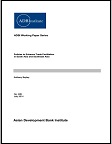 Policies to Enhance Trade Facilitation in South Asia and Southeast AsiaThis Asian Development Bank Institute publication identifies the state of play of trade facilitation and provides an overview of intra- and inter-regional trade in South and Southeast Asia. It highlights key challenges and bottlenecks to effective trade facilitation, ranging from the lack of expert human resources such as information technology specialists in small landlocked countries (Bhutan and Nepal), to the high border transaction costs and severe congestion faced at border crossing points, and the lack of effective dialogue on bilateral enhancement of trade facilitation. Regional initiatives such as the South Asia Subregional Economic Cooperation Program aim to address these challenges through customs modernization and harmonization, automation, and the use of international best practices in border procedures. Author: Anthony Bayley Year: 2014 Download Tags: South Asia, Trade Facilitation, Trade Policy, Southeast Asia, ADB, ICT, Bhutan, Nepal, SASEC, Customs Globalization in an Age of Crisis: Multilateral Economic Cooperation in the 21st CenturyIs globalization in retreat, ask editors of Globalization in an Age of Crisis. Hosting discussions on multilateralism in trade and macroeconomic issues, the book considers international policy making following the global economic crisis of 2008-2009 that saw countries prioritize policy initiatives advancing national interests over international economic cooperation. Critical junctures are considered, including the current WTO round and whether it can deliver on its promise to improve trading prospects of developing countries (chapter 3), and the compatibility of preferential trade agreements (PTAs) with multilateral trading systems (chapter 4). Empirical assessments measuring the 'successes' of existing PTAs are also included. Author: Robert C. Feenstra and Alan M. Taylor Year: 2014 Download Tags: Trade Policy, Trade, Economics, WTO Deepening India’s Shallow Export BasketIndia’s bilateral trade with the People’s Republic of China (PRC) grew to US$70 million in 2011 and growth trajectories suggest that bilateral trade will continue to expand. India exports low value-added products such as ores, cotton, and copper to the PRC; and imports high value-added and technology sophisticated products such as electrical machinery and equipment from the PRC. India suffers from lack of export diversification although manufactures are an increasing share of India’s bilateral export basket. The proposed PRC-India Free Trade Agreement (FTA) can deepen India’s export basket; and FTA-based reforms on pharmaceuticals, and information and technology services sector can significantly impact India’s bilateral trade composition. Author: Asian Development Bank Year: 2014 Download Tags: India, Trade, Trade Policy Unpacking the Bali Package: a Snapshot of Bali Ministerial Decisions of WTO MembersThe Bali Package represents a key turning point for the World Trade Organization. Covering trade facilitation, agriculture, and trade issues for developing and least-developed countries, it is set to increase trade activity on a global scale and lower the cost of doing international trade. This paper acts as a precursor to its implementation by identifying challenges countries may face, giving a brief history of each pillar, exploring the next possible steps for each ministerial decision, and examining the likely effects of this decision/agreement on various other stakeholders, particularly on consumers. Author: Archana Jatkar and Chenai Mukumba Year: 2014 Download Tags: Trade, Trade Facilitation, Trade Policy, WTO, Agriculture, Least Developed Countries, India Simulating World Trade in the Decades Ahead: Driving Forces and Policy ImplicationsThis working paper considers economic prospects up to the year 2100, offering assumptions about key exogenous variables, providing a baseline for climate change policy evaluation, and discussing sectoral and trade issues. The paper combines an economic growth model with a multi-sectoral model to construct scenarios for around 150 countries up to a maximum time horizon of 2035, with forecasts on a number of key variables such as energy prices, demographics, etc. It suggests that trends toward increased regionalization may be reversed, with multilateral trade relationships gaining in importance. Author: Lionel Fontagné, Jean Fouré and Alexander Keck Year: 2014 Download Tags: Climate, Trade, Statistics, Trade Policy, Policy, Energy, Tariff, ASEAN, India, Environment Macroeconomic Update: NepalThis issue explores various dimensions of Nepal’s export competitiveness, and stresses the need to address crippling domestic supply-side constraints to boost exports. It suggests that the country needs to properly utilize technical assistance through various financing windows to address constraints such as inadequate infrastructure, political instability, labor disputes, deficiency in human resources and research and development, among others. Author: Asian Development Bank Year: 2014 Download Tags: Economics, Trade Policy, Nepal Asian Market Development and Integration: Challenges and OpportunitiesThis book, co-published by Asian Development Bank (ADB) and Korea Capital Market Institute (KCMI), in collaboration with the Peterson Institute for International Economics, examines the path of capital market development in Asia since the 2008 global crisis. It presents the analytical framework for addressing capital market integration at the regional level and its likely impacts. Author: Asian Development Bank (ADB) and Korea Capital Market Institute(KCMI), eds. Year: 2014 Download Tags: Economics, Trade Policy, Regional Integration, Bangladesh, Bhutan, India, Maldives, Nepal, Sri Lanka 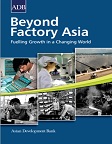 Beyond Factory Asia: Fuelling Growth in a Changing WorldThis paper assesses the challenges of Factory Asia – a model of regional networks connecting production centers in different Asian economies. It forms part of regional and global value chains and constitutes an important source of growth in the region. Regional cooperation is vital to the success of Factory Asia, which calls for greater South-South cooperation to leverage knowledge in domestic manufacturing, allowing countries such as India to leapfrog to higher value chains. For Bangladesh and Sri Lanka with small domestic markets, strategic options include carving out a niche in lower-value manufacturing. The paper further argues that policymakers should be wary of expanding or increasing the number of free trade agreements for the growth or spread of production networks. Author: Asian Development Bank Year: 2013 Download Tags: South Asia, Regional Cooperation, Trade Policy, Manufacturing, Exports, Small and medium enterprises, India, Agriculture, Bangladesh 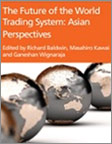 The Future of the World Trading System: Asian PerspectivesAccording to WTO Director-General Pascal Lamy, the problems facing Asian regionalism are a scaled-down version of the problems facing the world. Thus, solutions that address Asia’s noodle bowl would most likely work at the global level. This concise collection of short chapters is based on longer papers presented at the Geneva Conference on 11-12 March 2013, organized by the Asian Development Bank Institute and Centre for Trade and Economic Integration at the Graduate Institute of International and Development Studies, in collaboration with WTO. The chapters are written by leading Asian and international trade experts on key changes taking place in the world trading system and its policy implications for Asia. Author: Richard E. Baldwin, Masahiro Kawai, and Ganeshan Wignaraja, eds. Year: 2013 Download Tags: Regional Integration, Trade Policy, Trade, Global Value Chains, Global Production Network, Regional Trade, Trade Facilitation, India 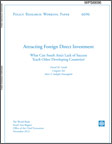 Attracting Foreign Direct Investment: What Can South Asia's Lack of Success Teach other Developing Countries?Despite South Asian nations experiencing increased foreign direct investment (FDI) flows over the past decade by gaining a large share of cross border investments, FDI inflows in South Asian countries still remain the lowest relative to gross domestic product (GDP) among developing country regions. This paper uses an empirical model that accounts for possible trends in convergence in the ratio of FDI to GDP between countries and cross-sectional data for 78 countries from 2000 to 2011. In examining the historical patterns of South Asia’s FDI and its connection with the policy environment, policymakers can identify constraints to FDI and boost potential for broad-based growth. Author: David M. Gould, Congyan Tan and Amir S. Sadeghi Emamgholi Year: 2013 Download Tags: South Asia, Trade Policy, FDI, GDP, Investment, Governance, Transparency, Economic Growth, Financial Sector, Regional Cooperation, Trade The ASEAN Economic Community: A Work in ProgressThis publication explores the barriers and impediments to the realization of an ASEAN Economic Community (AEC), and to what extent its self-imposed deadline of 2015 for achievement of an AEC is more of a milestone of progress than a firm target. It examines whether the AEC is achievable, the obstacles faced in achieving it, and the measures required to help it become a reality. Author: Asian Development Bank Year: 2013 Download Tags: Regional Cooperation, Regional Integration, Trade Policy, ASEAN, Economic Integration, Regional Cooperation, ADB, Regional Integration, Services, Global Value Chains, Non-Tariff Measures, Asia-Pacific Trade Agreement, India, Trade Facilitation Deepening Economic Cooperation between India and Sri LankaThis book analyzes the performance and impact of the India-Sri Lanka free trade agreement over the past decade and suggests the way forward. India became an important source of imports for Sri Lanka immediately after the implementation of the free trade agreement. Author: Asian Development Bank Year: 2013 Download Tags: Regional Cooperation, Trade Policy, India, Sri Lanka, Trade, Economic Cooperation, India-Sri Lanka Free Trade Agreement, Free Trade Agreements, Services, Trade Facilitation, Exports, Import Who Profits from Trade Facilitation Initiatives?This Asia-Pacific Research and Training Network on Trade (ARTNeT) Working Paper uses firm-level data on developing countries to investigate whether large firms benefit from trade facilitation. The findings show that firms of all sizes export more in response to improved trade facilitation. Trade facilitation can be beneficial to countries, including those engaged as suppliers in value chains. Author: Bernard Hoekman and Ben Shepherd Year: 2013 Download Tags: Trade Facilitation, Trade Policy Aid for Trade: An Investment Benefit Road Map for South AsiaAid for Trade (AfT) came to prominence just over a decade ago at the launch of the
World Trade Organization's Doha Round. With its focus on helping least developed
countries and economies escape the poverty trap, it aims to strengthen their
capabilities to meet market demand and to reduce supply-side constraints such as a lack of
trade infrastructure. Author: Asian Development Bank Year: 2013 Download Tags: Trade Policy, Poverty Reduction, Infrastructure, India, Bangladesh, Bhutan, Maldives, Sri Lanka, Nepal, Trade Facilitation, Transport, Global Value Chains, Exports 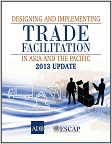 Designing and Implementing Trade Facilitation in Asia and the PacificThis reference book was published to support the implementation of trade facilitation measures and reforms in Asia and the Pacific. It includes operational guidance on assessing the status of trade facilitation, the measures and reforms needed, how to design trade facilitation initiatives, and how to implement them at national and regional levels. The book is intended to assist policy makers, practitioners, and economists by bridging the gap between theory and practice. The revised 2013 version includes updated statistical figures and data, information on actual trade facilitation policies and practices, and the most recent research on trade facilitation. Author: Asian Development Bank / United Nations Economic and Social Commission for Asia and the Pacific Year: 2013 Download Tags: Trade Facilitation, Regional Cooperation, Regional Integration, Trade Policy, Economic Corridor, Sanitary and Phytosanitary Measures, Technical Barriers to Trade, Revised Kyoto Convention, Customs, Customs Valuation, Bangladesh, Bhutan, India, Nepal, Maldives, Sri Lanka, Services Pan-Asian IntegrationIn today's globalized world where the economic fates of nations are inevitably linked, weathering the present economic storm for Asia will increasingly depend on harnessing regional dynamics particularly on the trade front. Pan-Asian Integration: Linking East and South Asia is a rich volume of perspectives from leading thematic experts on regional patterns of trade and investment, trade-related infrastructure, trade facilitation, among others. Author: Asian Development Bank Year: 2009 Download Tags: Regional Cooperation, Regional Integration, Trade Policy, Transport, Trade Facilitation, Economics, India, Free Trade Agreements 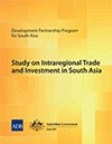 Study on Intraregional Trade and Investment in South AsiaThis study broadens and deepens intraregional cooperation and integration in trade and investment among South Asian countries. It showcases the benefits of regional integration and presents an array of policy recommendations to maximize and realize such gains. Three parallel initiatives are needed: first, reduce nontariff barriers to deepen the South Asian Free Trade Area (SAFTA); second, expand SAFTA's scope to include investments and services; and third, focus on key industries to succinctly demonstrate the process and benefits of reforms. These translate into six component studies: (i) the Role of Trade Facilitation in South Asian Economic Integration; (ii) Country Investment Studies for Bangladesh, India, Nepal, and Sri Lanka; and (iii) Textile and Clothing Industry. The study invigorates the debate and focus on South Asian integration as a means to further growth and reduce poverty. Author: Asian Development Bank / Australian Government Year: 2009 Download Tags: Trade Policy, Trade Facilitation, Regional Cooperation, Regional Integration, Bangladesh, India, Nepal, Sri Lanka, SAFTA |



